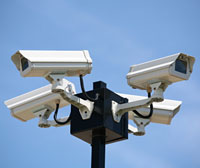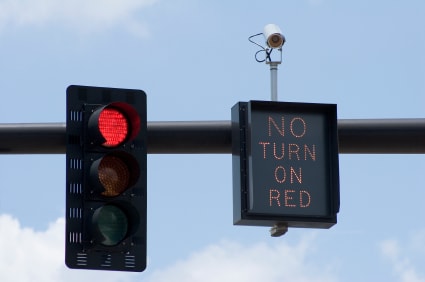
Steve Barkley was minding his own business. Cruising down the interstate near Campbell, CA, he was thoroughly enjoying himself. Depressing the gas pedal, he goaded his brand new Porsche 911 to lap up the pavement with increased urgency. The roof was lowered, the wind was rushing through his hair, and Tchaikovsky’s 1812 Overture boomed in his ears through the 8 speaker Bose Surround Sound System. Fine motoring didn’t get better than this.
Two months later, Steve was reclining poolside at his Pebble Beach home when the maid brought him the mail. Leafing through it lazily, a strange letter caught his eye. It was from the Campbell Police Dept. Curious as to the contents, he ripped it open, only to find a $45 speeding ticket. Along with it was a photo of his car zipping along the interstate, superimposed with the speed he was driving, the exact time and date, and the location of the camera. It seemed like Steve was yet another victim of the photo-radar speed cameras that were springing up all over the country.
Steve could have afforded to pay a million speeding tickets, but the principle of paying a fine because of a photograph bothered him. So he went to his office, photocopied two twenties and a five, and sent in a picture of $45! Unfortunately, the police chief of Campbell, James A. Cost, was up to the challenge. He sent back a picture of a pair of handcuffs. Steve sent in his check, post-haste. (True story, details embellished.)
Many Americans are enraged at the proliferation of speed-cameras. They are climbing up the walls of our freeways like parasitic vines, sucking millions out of the pockets of motorists. Some people question their constitutionality; others are enraged by the fact that private companies are making most of the money, only paying a contract fee to the municipalities. But most people are annoyed by the “Big Brother is Watching” vibe they get from them.
Loop 101, a highway near Scottsdale, AZ, is considered to be one of the pioneers of speed cameras. On a seven mile stretch, over six cameras were installed. During the first few months of their deployment, the city only racked up three million dollars in fines, because it was a pilot program and the fines were reduced. But as of Feb. 22, 2007, these cameras started clicking in earnest, spitting out $162 fines for anyone going over 76 MPH.
The numbers of speeders has gone down dramatically, and this has given the Arizona Dept. of Public Safety the impetus to begin taking bids from contractors to put up an additional 170 speed and red light cameras along Arizona highways! This is supposed to help them meet their goal of raising $120 million from the wallets of motorists to help bail the state economy out of its billion dollar deficit. Some of these cameras are going to be mounted on moving SUV’s, snapping away as they cruise down the freeways right next to you! Big Brother is Following You!
Just mentioning red light cameras opens a whole new can of worms. A report last year by the Federal Highway Administration and the Virginia Department of Transportation found that, “cameras were associated with an increase in total crashes.” People nervous about getting a ticket either short-stopped or sped up to get through while the light was still yellow. Rear-end crashes were up by as much as 139% at some intersections!
In order to ensure more profits for the companies running the cameras (who have to pay hefty contract fees for the right), cities have shortened the duration of the yellow light. Although lengthening the duration of the yellow light prevents crashes and promotes safety, shortening the yellow promotes revenue for cities and camera operators. Case in point: San Diego saw a $2 million increase in revenue from the city’s red light cameras after shortening its yellow period from 0.5-.3 seconds to 0.1 second! In Dallas, 7 out of 10 of the highest revenue-producing cameras have yellows that are shorter than the minimum recommendation of the Texas Department of Transportation. Big Brother is intentionally tripping me!
If you think we have it bad, look at our brethren across the puddle in the United Kingdom. Virtually every police force in England, Wales, and Scotland has been equipped with high-tech DVD-cameras which will be used to provide photographic evidence for a whole host of minor offenses. People caught eating, smoking, speaking on cell phones, or not wearing a seatbelt while driving will be sentenced with fines, driving suspensions, and even jail time for some of the more serious violations. While most of the cameras in the US can only capture a car and its license plate, the British ones will clearly capture the face of drivers. Big Brother is in my car!!!
I’m not sure if you’ve noticed by now, but I am not a particularly big fan of traffic cameras. (Although I probably won’t go as far as Clifford E. Clark III, who shot a camera on Broadway St. in Knoxville, TN three times with his hunting rifle, while sitting in his minivan across the street!) But whether I like them or not, one thing is clear; people are aware of them and act differently around them. In Loop 101, it means that only 2-6 percent of cars speed over 76 MPH, while near red-light cameras crashes are piling up as people react to the cameras. People are realizing that they can’t continue to live the way they used to because now there is an extra set of eyes watching them.
The Mishna in Ethics of Our Fathers says, “Consider three things and you will never come into the grip of sin: Know what is above you- a watchful Eye, an attentive Ear, and all your deeds are recorded in a Book” (Ethics, 2:1). It seems that long before traffic cameras were invented, there was another video camera which watched you, followed you, and was in your car! It was also in your house, school, synagogue, and even in the pickle store down the block. And there will come a time when we will watch that video again and again. Superimposed over each frame will be the ripple effects each action had, the people it changed, and the legacy it left. If people saw this camera as clearly as the one they see on the wall of the interstate, would they still gossip so much? Would they not spend the extra twenty seconds helping the elderly lady across the street? Would they use coarse language so often? Would they not smile to people just a bit more? Let’s go out there and make our own Oscar-winning performance, because the camera’s always rolling!
Leiby Burnham, LMSW, is a rabbi, psychotherapist, and writer. He lives in Detroit with his wife, an ICU nurse, who is on strict orders to “leave her patients at work” and their two daughters, Orah and Shifra. Rabbi Burnham works for the Jean and Theodore Weiss Partners in Torah program of Yeshiva Beth Yehudah, where he does community outreach, and runs a Jewish educational programs at University of Michigan, Wayne State, and Oakland University. He taught learning-disabled high school students for eight years in NYC, while receiving Rabbinical training at Shor Yoshuv Institute, and obtaining his Masters in Social Work from Yeshiva University.
The words of this author reflect his/her own opinions and do not necessarily represent the official position of the Orthodox Union.
